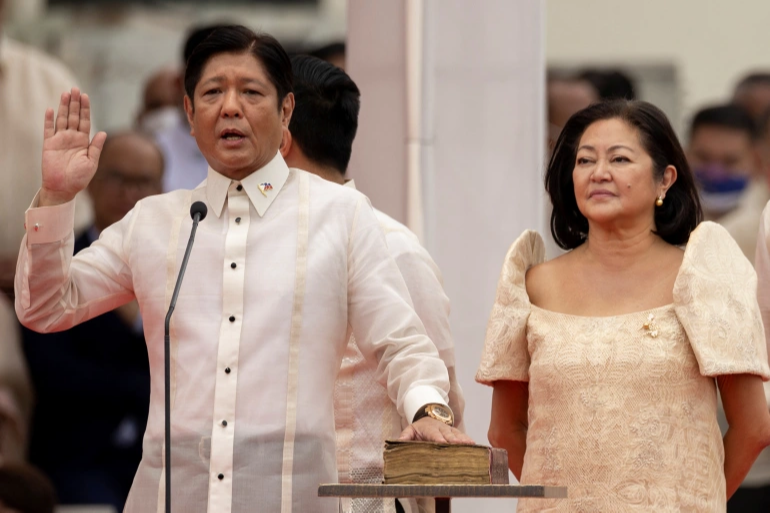
Filipino activists burn effigies depicting Philippine president-elect Ferdinand “Bongbong” Marcos Jr and vice president-elect Sara Duterte, during a protest denouncing their election in Quezon City, Metro Manila, Philippines, May 25, 2022 [File: Lisa Marie David/ Reuters]
Manila, June 30 (RHC)-- Ferdinand Marcos Jr, the son and namesake of the Philippines’s late dictator, was sworn in as the country’s new president. Marcos Jr’s inauguration on Thursday marked a stunning political comeback for one of Asia’s most famous political dynasties, 36 years after it was toppled in a popular uprising.
Known as “Bongbong”, Marcos Jr, who is 64 years old, won a rare landslide victory in last month’s presidential election, helped by what critics have said was a years-long campaign to whitewash the his family’s image. He succeeds Rodrigo Duterte, who gained international notoriety for his deadly drug war and has threatened to kill suspected dealers after he leaves office.
Marcos Jr took the oath at mid-day (0400 GMT) in a public ceremony at the National Museum in Manila in front of hundreds of local and foreign dignitaries and journalists. Chinese Vice President Wang Qishan and United States Vice President Kamala Harris’s husband, Doug Emhoff, were among foreign dignitaries attending the ceremony.
Activists and survivors of the martial law-era under his father plan protests timed to Marcos Jr’s inauguration, while more than 15,000 police, soldiers and coast guard personnel have been deployed across the capital for security.
Filipino activists burn effigies depicting Philippine president-elect Ferdinand "Bongbong" Marcos Jr. and vice president-elect Sara Duterte, during a protest denouncing the proclamation of them in their new political roles, in front of the Commission on Human Rights, in Quezon City, Metro Manila.
The elder Marcos ruled the Philippines for two decades from 1965, almost half of it under martial law, helping him to extend his grip on power until his overthrow and his family’s retreat into exile during the 1986 “People Power” revolution. Thousands of Marcos opponents were jailed, killed or disappeared during his rule, and the family name became synonymous with cronyism, extravagance and the disappearance of billions of dollars from state coffers. The Marcos family has rejected accusations of embezzlement.
Marcos Jr, a former senator and congressman, campaigned on the slogan “Together, we shall rise again” -- invoking nostalgia for his father’s rule, which his family and supporters have portrayed as a golden age for the Philippines, while ignoring the corruption and rights abuses of the patriarch’s 20-year rule.
Crucial to Marcos Jr’s success was also an alliance with Duterte’s daughter, Sara, who secured the vice presidential post with more votes than him, and the backing of rival dynasties.
Meanwhile, a last-ditch bid by activists to thwart Marcos Jr, among them victims of persecution under martial law, failed on Tuesday when the Supreme Court dismissed petitions seeking to disqualify him for tax offences decades ago.
The new president’s opponents fear he could use his victory to entrench himself in power. “Marcos Jr’s refusal to recognise the abuses and wrongdoings of the past, in fact lauding the dictatorship as ‘golden years’, makes him very likely to continue its dark legacy during his term,” warned leftist alliance Bayan.
His supporters, however, are counting on him to deliver on pledges to create jobs and bring down consumer prices in a country of 110 million people, nearly a quarter of whom live on less than $2 per day.
He has promised to hit the ground running and has even appointed himself agriculture minister, citing the urgent need to boost production to prevent food shortages and help manage prices.
“Marcos’s number one priority will be, and should be, economic recovery over the next six months and first year,” said Richard Heydarian, an author, columnist and academic who specialises in politics. “That will set the tone for his administration for the years to come.”
On foreign policy, Marcos Jr said last month he would adopt a “friends to all, enemy to none” approach. Unlike Duterte, who pivoted away from the United States towards China, Marcos Jr has insisted he would uphold an international ruling against Beijing over the resource-rich South China Sea.
While he has backed Duterte’s drug war, which has killed thousands of mostly poor men, he is not likely to enforce it as aggressively.
“I think the Philippine political elite are ready to move on from a violence-led drug war,” said Greg Wyatt, director for business intelligence at PSA Philippines Consultancy.
“The drug war attracted enough negative attention.”

